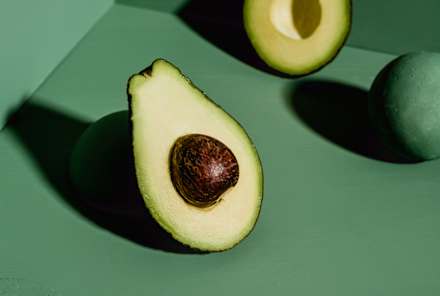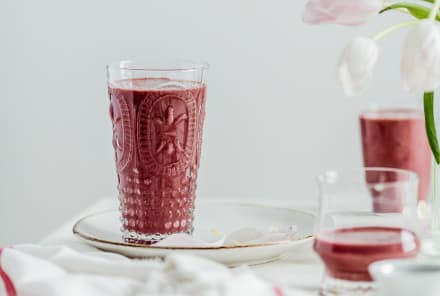Advertisement
This Super-"Healthy" Food Is Messing With Your Hormones

A food that's healthy for one person might not be healthy for another—for this reason, I try to really stay away from universally declaring one food a villain and one food a hero in my practice. While, yes, most functional doctors like myself agree that fast food and processed food aren't great for people, things start to get murky when you enter the realm of dairy, whole grains, meat, and protein powders.
There is, however, one food group that I consistently find interferes with my patient's hormone goals. It's deemed healthy, but time and time again in my practice, I've found it to get in the way of my patients' abilities to find natural hormone balance.
It's fruit.
I know it's a controversial statement. Fruit is all natural, and filled with phytonutrients and antioxidants—I get it. And to be clear, if you're replacing a cupcake with a few orange slices, I applaud your steps toward a healthier lifestyle. But if you're trying to balance your hormones, it might make sense to step away from fruit for a little bit.
Apples, oranges, pineapples, and cranberries have 24, 21, 32, and 31 grams of sugar, respectively. Fruit-filled smoothies often contain more sugar than a candy bar!
OK, but how is fruit actually messing with your hormones?
Our bodies respond to fruit quickly—especially when it’s a form of a juice for example. First it raises your blood sugar, which then in turn raises insulin. When insulin spikes, the body starts to rapidly absorb the sugars and store them for later. But with a lot of spikes and doing this chronically, it leads to insulin resistance and increases cortisol and estrogen levels.
Cortisol, a glucocorticoid (steroid hormone), is the one that’s known as our fight-or-flight hormonal response. Cortisol release in the setting of insulin resistance has been thought to be the link between fructose (fruit sugar) and disease.
For example in type 2 diabetics, cortisol secretion has been suggested to be a possible link between insulin resistance and hypertension, obesity, coronary heart disease, hyperlipidemia, and worsening type 2 diabetes.
In addition to this cortisol problem, insulin also reduces the amount of sex hormone binding protein, which usually binds excess estrogen. With insulin resistance comes lower levels of SHBP and more estrogen.
Lastly, it turns out that fruit sugar (fructose) may be even worse than glucose. It seems that the digestive tract doesn’t absorb fructose as well as other sugars. More fructose then goes into the liver. Too much fructose in the liver creates a series of events that can lead to hormonal imbalance, fatty liver disease, systemic inflammation, type 2 diabetes, and obesity.
The solution is simple.
When it comes to fruit, I advise those trying to balance their hormones to stick to berries and possibly one other serving of fruit (in a green smoothie, for example). I also, of course, ask them to limit their overall sugar load, not just limit the fruit.
For example, when you create your morning smoothie, go heavy on the greens and add a little fruit just to cut the taste. Keep the ratio simple. Toss in about 2 to 3 cups of greens (kale, spinach), 2 cups of liquid (almond milk, water, or coconut water), and 1 to 2 cups of berries. For an added boost, toss in some chia or flaxseeds; for extra antioxidants, you can add cinnamon, which mimics the idea of sugar to your taste buds and actually tricks your brain. There's also evidence that cinnamon can actually combat the effects of sugar—in one study1, cinnamon was shown to have a significant effect on increasing the body’s HDL (good cholesterol) and decreasing glucose levels (counteracting how sugar raises them).
If you want to learn more about eating for hormone balance from Dr. Shah, be sure to check out mbg's functional nutrition program!

Dr. Amy Shah is a double board certified MD with training from Cornell, Columbia and Harvard Universities. She was named one of mindbodygreen's Top 100 Women In Wellness to Watch in 2015 and has been a guest on many national and local media shows. She helps busy people transform their health by reducing inflammation and eating more plants, utalizing the power of the microbiome to help digestion, natural hormone balance and food sensitivities. She is an expert on intermittent fasting for women and has a 2 week guided group program.
More from the author:
Functional Nutrition Training
Check out Functional Nutrition Coaching
A cutting-edge nutrition deep dive taught by 20+ top health & wellness experts
Learn moreMore from the author:
Functional Nutrition Training
Check out Functional Nutrition Coaching
A cutting-edge nutrition deep dive taught by 20+ top health & wellness experts
Learn more
Dr. Amy Shah is a double board certified MD with training from Cornell, Columbia and Harvard Universities. She was named one of mindbodygreen's Top 100 Women In Wellness to Watch in 2015 and has been a guest on many national and local media shows. She helps busy people transform their health by reducing inflammation and eating more plants, utalizing the power of the microbiome to help digestion, natural hormone balance and food sensitivities. She is an expert on intermittent fasting for women and has a 2 week guided group program.


















